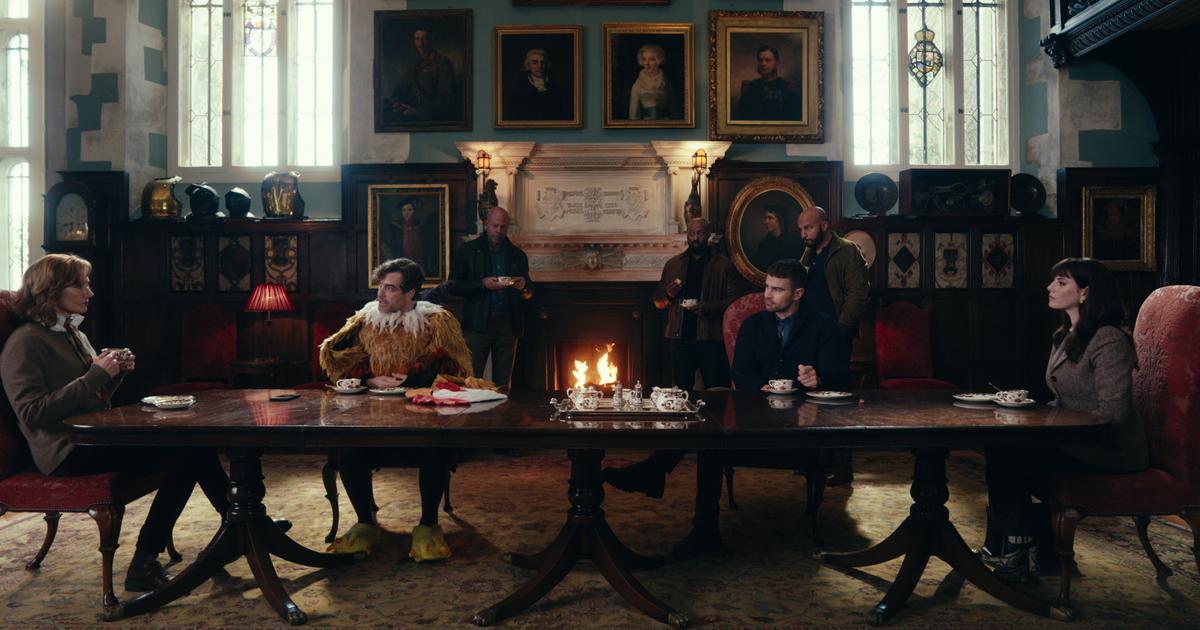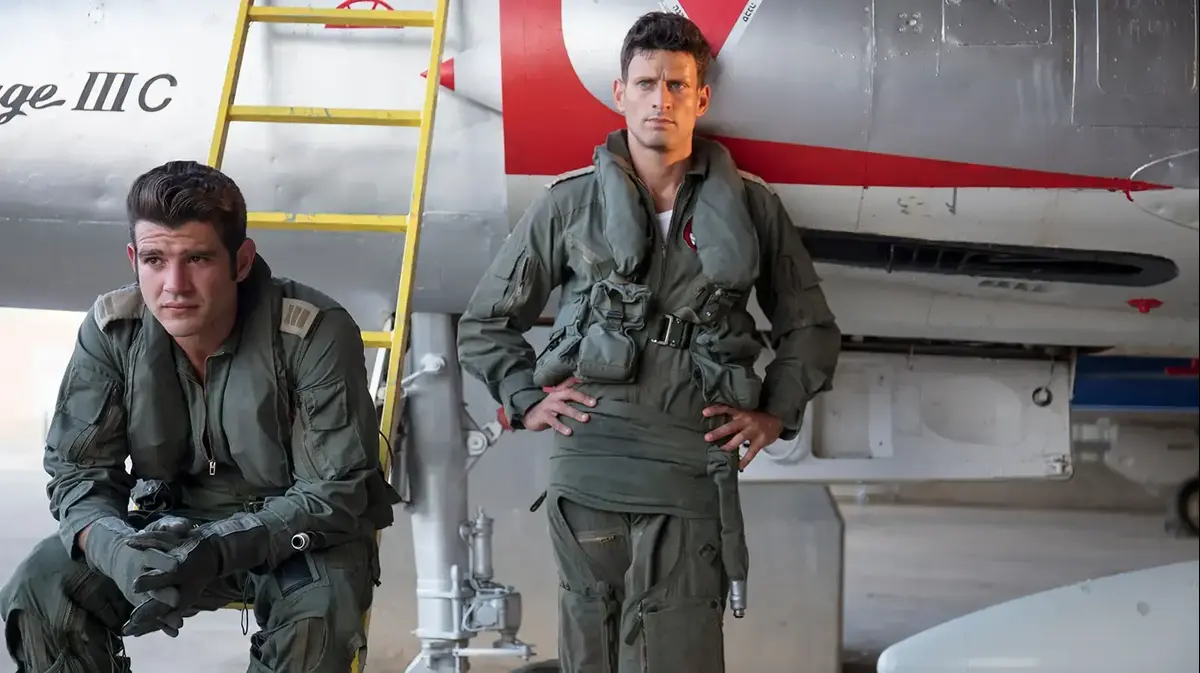During the first weekend of the lockdown, a year ago now, director Adam Mason sent an email to producer Adam Goodman.
In the subject he wrote: "Crazy idea!"
The proposal was to shoot a film about Covid-19 but set in 2024, with a lethal mutation of the virus and society living under the control of the army.
A day later, Michael Bay joined the project as a producer.
And now the result is released,
Immune
.
Critics have condemned the film not so much for its quality (very low, according to experts) but for its very existence.
“After months of fear, anxiety, mistrust and exhausted hope, do you fancy a movie that takes all of that and takes it to full power?
Immune
gives us hope that no matter how bad the pandemic goes, there will always be people who can benefit from our collective despair, ”wrote Halle Kiefer in
Vulture
.
They say that comedy is the result of the sum of tragedy plus time, but how long must pass before a tragedy can be entertainment?
For Mime Misu, three weeks.
In 1912, this Romanian artist shot
In the Night and the Ice
less than a month after the sinking of the
Titanic
.
Misu laid the foundations of that cinematographic subgenre by betting on human melodrama: the nanny who saved the baby from the Allison family, a first-class family, to preserve the surname and lineage while the rest of the clan drowned.
By the time James Cameron shot
Titanic
85 years later, only seven survivors of the wreck remained.
So the catastrophe was no longer a psychological event (collective trauma), nor a political (symbol of the end of the class system), nor magical (a lesson, like the Universal Flood of God, against the arrogance of the civilization that it believed to have dominated nature).
In 1997 the shipwreck was just a romantic myth.
So audiences experienced the film as a spectacle: Cameron's reproduction was so rigorous that everyone today feels, in their head, that they have seen the Titanic sink.
The philosopher Jean Baudrillard said that “We violently desire the event, no matter what, as long as it is something exceptional that breaks the tyranny of meaning.
And, passionately, we hope that nothing happens and that things continue to be in order. "
The impossible
(Juan Antonio Bayona, 2012) resorted to this formula: 90 minutes of tsunami, chaos, destruction, powerlessness, loss, uncertainty and death finished off by an ending in which order (represented by the maximum symbol of order from the second middle of the 20th century: the family) is reestablished.
Ewan McGregor and Naomi Watts fly home, and then viewers return to their lives with a sense of peace.
Almost 230,000 people in 14 countries died from the 2004 tsunami. Of these, 170,000 in Indonesia.
In his review for
The New York Times
, AO Scott lamented that the film conveyed the feeling that most of the tsunami victims were Western tourists without showing the effects it had on the local population.
“There is complacency and lack of compassion in
The Impossible
, a film that is not so much an exploration of mass destruction as a story about a ruined vacation.
It could be said that it is also a film about the consequences of global inequality, but if it is it is only by accident ”.
"An alibi"
To be considered morally acceptable, movies about real tragedies need an alibi.
A justification for their existence that legitimizes them.
Elephant
proposed an artistic, psychological and sociological reflection on the Columbine High School shootings.
Schindler's list
was a solemn document with aspirations of historical chronicle (hence it was posted in every institute).
The HBO series
Chernobyl
, an office drama about the forgotten heroism of scientists and the unforgivable opacity of the Soviet dictatorship.
The promotional campaign for
The Impossible
transmitted values that no one would dispute: courage, family, solidarity.
It broke all the records of Spanish cinema, with 6.5 million viewers at the box office, and in its premiere on Telecinco two years later it almost equaled that figure.
But would the Spanish public have gone so happily to see a movie about a tsunami if it had happened in Spain?
In 2010, two years after the Spanair accident, Telecinco premiered the miniseries
Flight IL8714
despite several attempts by victims' associations to prevent it.
The audience did not show much interest: it made an 11% share of the screen compared to the 16% of the film
Two Rebel Policemen 2,
on Antena 3. In the Canary Islands, where most of the victims resided, it scratched 13% of the audience, but it was even further away from the 21.5% who made the Antena 3 film. "Why has Telecinco been spent all this money on making a mess like this?", criticized the father of a deceased in the incident in
La View of Tenerife.
The lack of interest in that miniseries could be due to the fact that the public considered it in bad taste, or perhaps too painful, but it is likely that it also influenced that the accident received such media coverage that the audience was not curious to see more.
The day after the incident, the magazine
It's Passing
put a reporter on a flight on the same route to record the passengers and flight attendants crying with anxiety.
The box
brought a man who had lost three direct relatives for Emma García to help him overcome his trauma.
When
Flight IL8714
was released
, audiences simply felt that this was a movie they had already seen.
A year later, Telecinco tried again with
11-M, so that no one forgets it
, but this time the screenwriter Carlos López, a journalist training, accepted the rigor.
“When they proposed it to me, it seemed crazy,” he recalls, “Why not make a documentary?
But later, thinking about it, I understood that fiction reaches more people because it has the ability to move the viewer.
And the viewer wants you to move him.
He is looking for an emotional alibi to satisfy his interest or his curiosity ”.
“The three days after, between the attack and the elections, are tremendously cinematic.
But all citizens live them with great passion.
What approach did we give it?
What would be the moral background?
And what actors did we take?
It was going to look like
Sesame Street
.
Pedro Casablanc as Zapatero, Javier Gutiérrez as Aznar.
Everyone has their own 11-M, each viewer would have a private version of the event, ”says López.
It took him three days to come up with the key idea of not telling about the attack, but about what fewer people knew: how exactly he got to it.
For this, he relied exclusively on the documents of the judgment of the National Court and the Supreme Court, moving away from melodrama and approaching the
thriller
.
Peter Morgan, the author of
The Crown
, says that facts are just dots and that his job is to create the line that connects them.
What kind of person would get involved in terrorism?
We had to fable them as if they were characters, of course, but with care not to lead the viewer to empathize with the terrorists ”.
Between empathy and respect for privacy
The solution was to spread the limelight among various jihadists and propose train passengers with whom the audience could become emotionally involved.
To respect the privacy of the victims, invented profiles were created: people who never went on that train but that day they did, people who had just been fired, people who were late for work because they had been celebrating Madrid's victory against Bayern for a goal from Zidane.
11-M, so that nobody will forget it,
did not attract too many spectators, although it did win an Ondas Award.
López is proud of the work he did and believes that, if released today, it would arouse the same controversy among victims' associations as in 2011. Or even more.
"In Spain we immediately feel attacked, we have a lot of feeling on the side," explains López when we asked him why Spain is so unlikely to make fiction of its own history.
“The British and the Americans are capable of making great movies about their history.
At
United 93,
even the extras were relatives of the victims, ”he compares.
If geographical remoteness is key for the public to be willing to relive catastrophes, temporal remoteness also plays a factor.
Five years after the attack on the Twin Towers, in 2006, Hollywood approached the tragedy with two very different approaches: the aforementioned
United 93
, by Paul Greengrass, a speculation of what happened inside the only plane that crashed in the open field;
and
Oliver Stone's
World Trade Center
, a melodrama starring Nicolas Cage about the firefighters who went to the skyscrapers first.
Both failed at the box office.
"One of the most common observations after 9/11 was that the image of the Twin Towers on fire was 'like a movie.'
It was something so terrifying that it did not fit our reality, our understanding, "analyzed Eric Kohn in
Indiewire
.
The September 11 attack had its villain (Osama Bin Laden), its heroes (the firefighters), its sequel (the Iraq war) and even its soundtrack (two songs titled
Hero
, one by Enrique Iglesias and another by Mariah Carey ).
Even its duration, one hour and 50 minutes, seemed conceived by a film studio.
There has been much speculation about the extent to which Al-Qaeda drew inspiration from Hollywood blockbusters for its attack: there are few images more powerful than a crumbling symbol of power, economic and cultural.
Joe Viskocil, the designer of the massive destruction of
Independence Day
(the White House, the Empire State), fell into a depression because he was convinced that he had given them the idea.
It is known, for example, that many members of Al-Qaeda dress like Sylvester Stallone in
Cornered
and call each other “Rambo”.
Everything is in the cinema (even reality)
The western population has a mediated perception of reality: they understand better what is happening around them if it is in the form of history.
“Most dramatizations of real tragedies offer comfort, because they impose reason and meaning on a senseless loss.
It is comforting to believe that the people who fought for survival in a dangerous situation were good.
That their lives had meaning.
There is no movie about shitty people surviving the Holocaust thanks to the tenacity of their spirit ”, analyzes Charles Bramesco of
Rolling Stone
.
At the
World Trade Center
, Jesus Christ gives a bottle of water to a firefighter.
When critics questioned that decision, Stone indicated that this was told by one of the surviving firefighters.
But just because something really happened doesn't mean it's going to work in a movie.
Norway's
Utoya.
July 22
aspired to reconstruct the massacre on the island with such accuracy that it is shot in a sequence shot, the number of shots is the same as the murderer fired and the protagonist begins to sing
True Colors
by Cyndi Lauper to reassure her friends .
A real fact that, cinematographically, is questionable: "The moment tries to make the viewer cry, as if the murder of 77 people was not enough", criticized Simran Hans in
The Guardian
.
Faced with criticism, the director defended that he made the film to ensure that the incident never falls into oblivion.
But what happens when, far from having forgotten the tragedy, the public is still immersed in it?
The director of
Immune
has described her as "
Romeo and Juliet
, but separated by a virus and a door."
Love is a common alibi when adapting a real tragedy to the cinema and divides the subgenre into two large groups: films with a sentimental approach (either romantic, patriotic, or both, such as
Pearl Harbor
, by Michael Bay) and those who opt for an austere historical chronicle (
Chernobyl
).
Some, few, set out to combine both approaches successfully (
Schindler's List
,
Titanic
) and then become cinematic landmarks.
But
Immune
actually
falls into a third group: movies that use real misfortune to make up a shocking story.
Hindenburg
(Robert Wise, 1975) adapted the accident of the German zeppelin that went up in flames over Lakehurst station (New Jersey) in 1937. This was the first filmed accident narrated by radio, which traumatized the population to the point of that zeppelins stopped being used.
The lament of the announcer Herbert Morrison ("Oh, humanity!") Is part of popular folklore today, but far from evoking that epic existential despair, Hollywood decided to make a
thriller
about some Nazis who sabotage the Hindenburg.
One of the most unlikely theories and with less evidence but, of course, the most cinematic of all.
Immune
knows exactly what it is doing when a montage of radio voices explains all the context that the viewer needs in 90 seconds: in the 214th week of confinement, the virus has mutated until it becomes lethal for everyone who contracts it (Covid-23) so that the infected are locked up in concentration camps to await death and the army has taken control of society.
Almost all the immune ones work as
riders
or removing corpses.
The plot centers on the rider Nico (KJ Apa), who is in love with Sara (Sofia Carson), a girl whom he only knows by video call.
There's also a subplot centered around May (Alexandra Daddario), a singer and Instagram star thanks to her covers of pop songs.
The film's credits consist of a succession of YouTubers, Instagrammers, and TikTokers explaining what it's like to live in 2024. In short, all the conspiracy theories of 2020 turned out to be true.
“Do you remember when they told us it was
fake news
?
Well, this is worse! ”, Says one.
"They told us to put on masks, but they were useless!" Another complains, "I signed up for a PCR waitlist at a Burger King, but the Burger Kings have already closed!"
At the end, a girl explains in an
story
that she has heard a lot of rumors about the corruption of the healthcare system.
Immune
was released in the United States on digital platforms without much repercussion (it reached the fourth position of the most rented films in its first weekend) and in this way the public offered its answer: yes, it is too soon.
You can follow ICON on
,
,
, or subscribe here to the
Newsletter
.







/cloudfront-eu-central-1.images.arcpublishing.com/prisa/QE5CHA6B7NGMBHBPEHCPSXLSAU.jpg)

